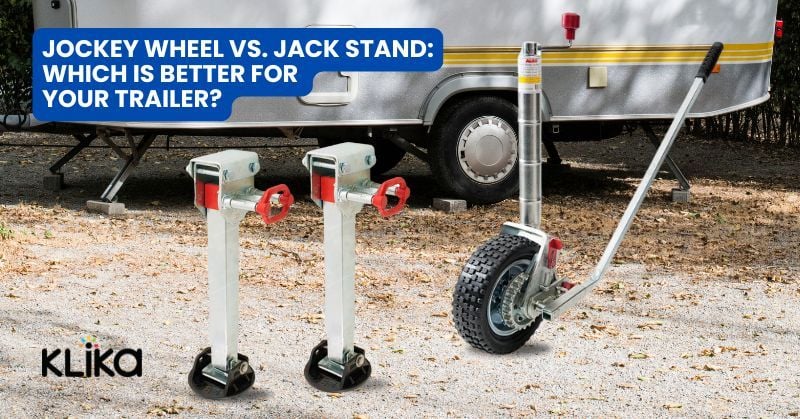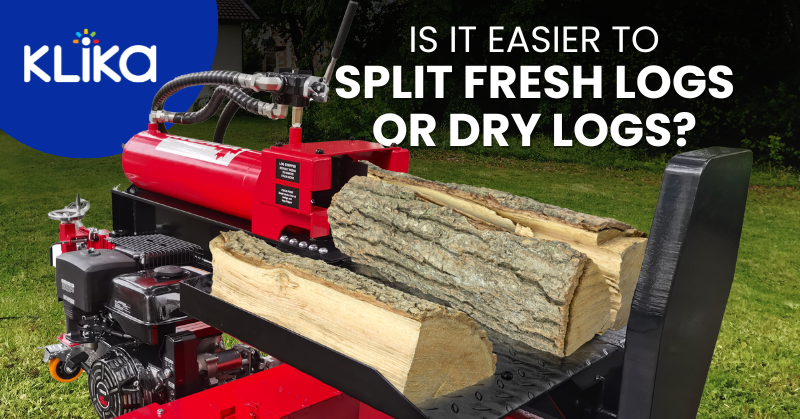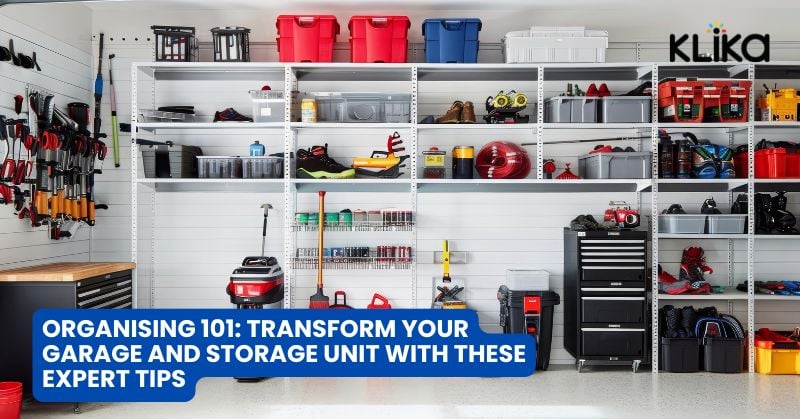Picking the right gear is important when parking your trailer or caravan while parked. Enter the jockey wheel and the jack stand — two essential tools to make your life easier.
A jockey wheel lets you adjust the front of the trailer’s height, making hitching and unhitching a piece of cake. They are also particularly useful for maneuvering and parking the trailer in tight spots.
On the flip side, the jack stand, although also height-adjustable, is only a solid, stationary support that carries the weight of your trailer, keeping it steady and safe.
Both play vital roles, but knowing their differences can help you choose what suits your needs best.
What’s the Difference Between a Jockey Wheel and Jack Stand?
If you're thinking about the best support for your trailer or caravan, it's important to grasp the main distinctions between a jockey wheel and a jack stand.
Design
-
Jockey Wheel: Typically designed with a wheel attached to a telescopic arm, the jockey wheel is mounted to the drawbar of the trailer or caravan. This design allows for easy movement and positioning.
-
Jack Stand: A jack stand is a solid, height-adjustable support without wheels. It provides stability by bearing the trailer's weight when it is parked.
Functionality
-
Jockey Wheel: Ideal for maneuvering the trailer or caravan into position, especially on uneven surfaces. It can be adjusted to different heights, making it versatile for various hitching and unhitching scenarios.
-
Jack Stand: Provides a stable, fixed support that ensures the trailer remains level and secure while parked. It is especially useful for long-term parking or storage.
Ease of Use
-
Jockey Wheel: Easier to use for short-term stops and when frequent movement is required. The wheel allows for smooth rolling and adjustments.
-
Jack Stand: Requires more effort to set up but offers superior stability. It is less convenient for frequent adjustments but excels in providing a stable base for longer periods.
Appropriate Usage
-
When to Use a Jockey Wheel: Ideal for frequent maneuvering and adjustments, such as when hitching or unhitching, parking the trailer or moving it short distances by hand.
-
When to Use a Jack Stand: Best for long-term stability, such as when storing the trailer or caravan or when it needs to remain level and secure for extended periods.
Benefits and Drawbacks
-
Jockey Wheel
-
Benefits: Provides mobility, easy height adjustment and is convenient for short-term use.
-
Drawbacks: May not offer the same level of stability as a jack stand, especially on uneven ground.
-
Jack Stand
-
Benefits: Offers superior stability and is ideal for long-term use. Ensures the trailer remains level and secure.
-
Drawbacks: Less convenient for frequent adjustments and requires more effort to set up.
Knowing these differences will really help you in picking the best support for your trailer or caravan, guaranteeing convenience and safety whether you're on the go or parked for a long time.
Now let's talk about the pros and cons. Jockey wheels and jack stands both offer unique benefits and drawbacks despite both being great tools for supporting your trailer or caravan. So let's delve into the pros and cons to help you make an informed decision.
Pros and Cons of Jockey Wheels
Jockey Wheel Pros
-
Easy Maneuverability: A jockey wheel allows for easy movement and positioning of your trailer or caravan, making it simple to hitch, unhitch and move by hand.
-
Height Adjustability: The telescopic arm of a jockey wheel can be adjusted to various heights, offering flexibility in different hitching and parking scenarios.
-
Convenience: Ideal for short-term stops and frequent adjustments, a jockey wheel is user-friendly and quick to set up.
-
Mobility: The wheel design enables smooth rolling, even on uneven surfaces, which is especially useful in tight spaces or when precise positioning is needed.
Jockey Wheel Cons
-
Limited Weight Capacity: Jockey wheels are typically designed for lighter loads, so they may not be suitable for very heavy trailers or caravans.
-
Difficulty on Rough Terrain: The wheel may struggle on rough or uneven ground, making maneuvering challenging and less stable.
-
Less Stability: Compared to jack stands, jockey wheels may not offer the same level of stability, particularly for long-term parking or on sloped surfaces.
-
Potential for Wear and Tear: Frequent use and exposure to various surfaces can cause the wheel to wear out over time, necessitating maintenance or replacement.
Pros and Cons of Jack Stands
Jack Stand Pros
-
Enhanced Stability: A jack stand provides superior stability compared to a jockey wheel, making it ideal for long-term parking or use on uneven surfaces.
-
High Weight-Bearing Capacity: Jack stands are designed to support heavy loads, making them suitable for larger trailers and caravans.
-
Durability: Built from robust materials, jack stands can withstand harsh conditions and frequent use without significant wear and tear.
-
Reliable Support: The fixed nature of a jack stand offers consistent and reliable support, reducing the risk of movement or tipping.
Jack Stand Cons
-
Lack of Maneuverability: Unlike jockey wheels, jack stands do not allow for easy movement or repositioning of the trailer or caravan.
-
Setup Complexity: Setting up a jack stand can be more time-consuming and complex compared to a jockey wheel, especially for frequent adjustments.
-
Difficulty on Uneven Surfaces: While providing stability, jack stands can be challenging to set up on very uneven or sloped terrain, requiring additional effort to ensure a level setup.
-
Fixed Position: Once in place, a jack stand does not offer the flexibility to easily change the position of the trailer or caravan, limiting its convenience for short-term stops or frequent adjustments.
So, jockey wheels and jack stands each have their own important jobs when it comes to supporting trailers and caravans. Jockey wheels are great for easy moving around and adjusting height, perfect for flat surfaces. Meanwhile, jack stands are all about stability and handling heavy weights, making them perfect for long-term parking and rough terrains.
If you're still undecided between a jockey wheel or a jack stand, just think about what you really need. If you're always on the move with your trailer or want quick height changes, go for the jockey wheel. But if you need solid and steady support, especially on bumpy ground, then the jack stand is your go-to. Of course, having both gives you the best of both worlds.
So, are you ready to change your trailer maintenance game? Check out our range of high-end jockey wheels at Klika!











